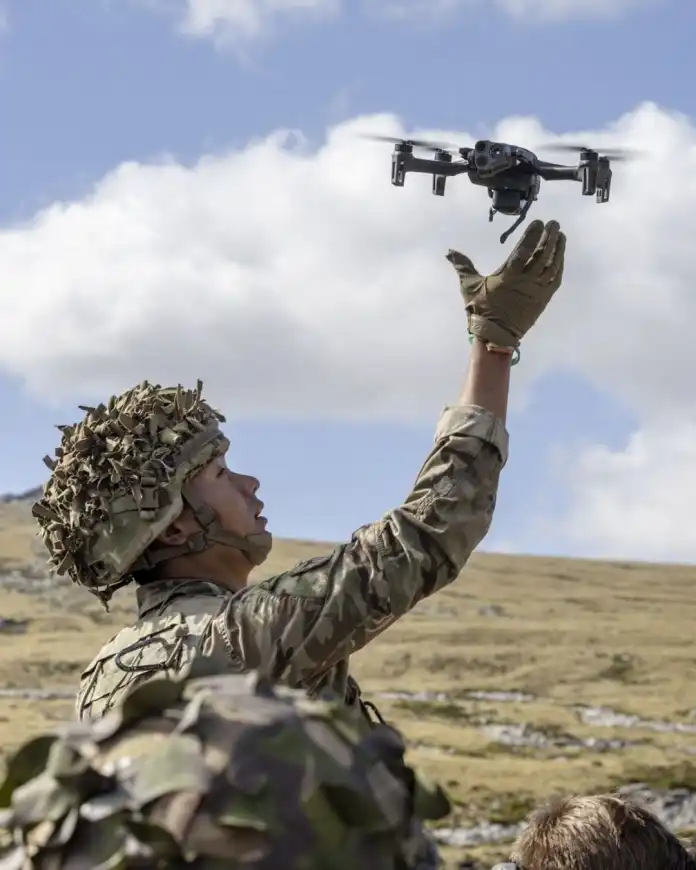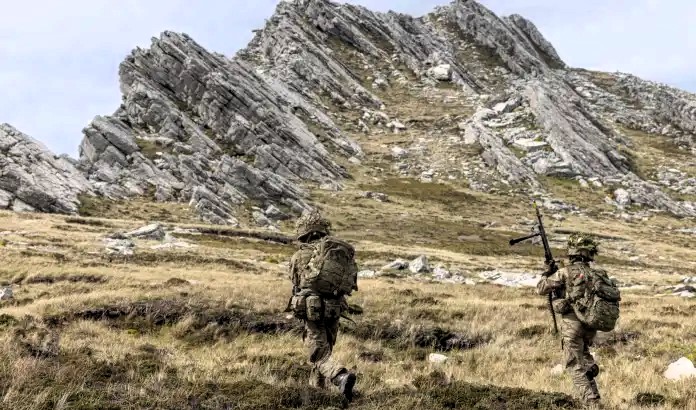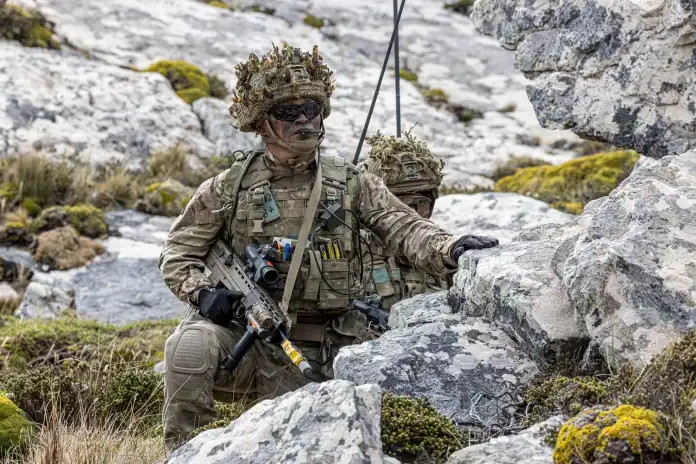En un nuevo gesto de consolidación militar británica en el Atlántico Sur, la Sección 2 del Regimiento Real de Fusileros Gurkhas, llevó a cabo una serie de ejercicios militares avanzados en las Islas Malvinas bajo el nombre de Cabo Kukri III. Las maniobras incluyeron fuego de fogueo y real, simulacros de combate nocturno y diurno, operaciones conjuntas con la Real Fuerza Aérea (RAF) y el despliegue táctico de drones, marcando una nueva fase en el adiestramiento de las fuerzas británicas en territorio ocupado.

Estas operaciones se enmarcan dentro de una política sostenida por el Reino Unido desde 1982, con el objetivo de mantener una presencia militar robusta en el archipiélago. Siendo la base aérea de Monte Agradable (Mount Pleasant), el centro neurálgico de estas actividades, albergando recursos estratégicos como aviones Eurofighter Typhoon, Airbus 400 Atlas, sistemas misilísticos de defensa aérea y efectivos de infantería de élite, de manera rotativa.
Un escenario de entrenamiento con doble propósito
El ejercicio “Cabo Kukri III”, que se desarrolló a lo largo de una semana, no se limitó a prácticas convencionales. Incluyó tareas complejas como la ocupación de posiciones en áreas de difícil acceso, particularmente en sectores como Monte Harriet, y la integración con plataformas aéreas para simulacros de asistencia y defensa coordinada, además del despliegue de drones.

Estas prácticas fueron acompañadas por un ejercicio de reabastecimiento aéreo inédito: el lanzamiento de más de 21 toneladas de suministros desde un avión A400M Atlas en las cercanías de Pradera del Ganso, considerado el mayor despliegue logístico de este tipo en la historia reciente británica en Malvinas. Esta maniobra, lejos de responder a necesidades humanitarias como se insinúa desde voceros británicos, refuerza una política de ocupación con alta capacidad de proyección táctica en escenarios remotos.
Consolidación militar en territorio usurpado
El accionar de las fuerzas Gurkhas y las prácticas de interoperabilidad entre unidades terrestres, aéreas y navales —como el entrenamiento reciente a bordo del patrullero HMS Forth— responden a una estrategia integral británica para garantizar el dominio operacional sobre un enclave geopolítico ocupado.

Este tipo de ejercicios, diseñados para operar bajo condiciones climáticas adversas y topografía compleja, no hacen más que reafirmar la vocación de permanencia de Londres en el archipiélago. El HMS Forth, que completó una rigurosa evaluación FOST (Flag Officer Sea Training), se mantiene como una de las principales plataformas de vigilancia en la región, garantizando una presencia naval permanente en línea con las capacidades disuasivas británicas.
El silencio diplomático argentino y las implicancias geopolíticas
Pese a las reiteradas denuncias históricas de la República Argentina ante Naciones Unidas por la militarización de las Islas Malvinas, bajo la gestión actual del presidente Javier Milei no se han producido declaraciones oficiales recientes respecto de estos ejercicios. Esta omisión contrasta con las posturas activas de gobiernos anteriores que apelaban al principio de desmilitarización del Atlántico Sur, consagrado en resoluciones de la ONU.
A contramano de la tradición diplomática argentina, Milei introdujo recientemente un enfoque inédito —y para muchos sectores, controvertido— al sugerir que los habitantes de las islas podrían “votar con los pies” y optar por ser argentinos. Durante el acto oficial por el Día del Veterano y de los Caídos en la Guerra de Malvinas, el mandatario expresó que anhela que “los malvinenses decidan algún día votarnos con los pies a nosotros”, en una formulación que fue interpretada como un reconocimiento implícito del derecho a la autodeterminación de los kelpers.
Esta declaración representa un giro conceptual respecto al enfoque basado en la integridad territorial, pilar del reclamo argentino respaldado por resoluciones de la ONU que rechazan la autodeterminación para poblaciones implantadas por ocupación colonial. Aunque Milei reiteró su “reclamo inclaudicable” por la soberanía, evitó condenar la ocupación británica o exigir su reversión, priorizando una lógica de atracción económica por sobre el reclamo jurídico.
El discurso provocó críticas tanto en ámbitos diplomáticos como en la sociedad civil, al considerar que socava la posición argentina en foros internacionales y podría fortalecer el argumento británico. Asimismo, la utilización del término “malvinenses” para referirse a los kelpers fue vista como una concesión simbólica a la narrativa del Reino Unido. Desde una perspectiva estratégica, esta aparente concesión podría ser utilizada por Londres como herramienta para legitimar su control sobre el archipiélago.
Fuente:






